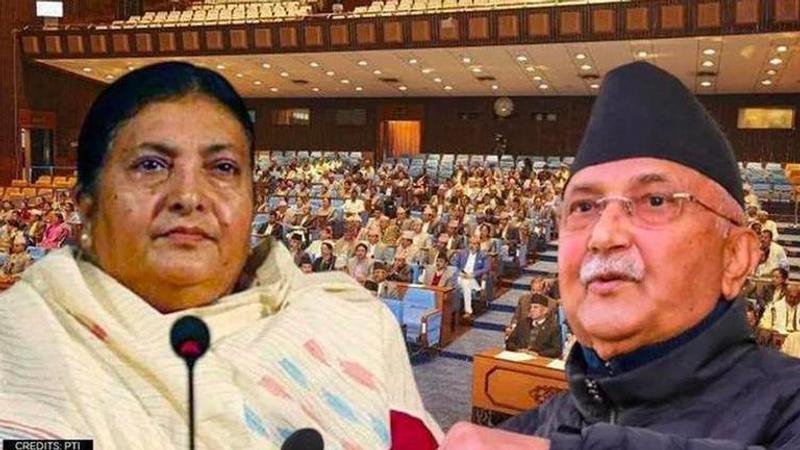Published 19:14 IST, May 23rd 2021
Nepal: Protests erupt against parliament dissolution; 3 NC cadres arrested by police
Massive protests broke out against dissolution of the House of Representatives (HoR) in Nepal against dessolution of the parliament and elections in November.

Advertisement
At least three cadres of Nepali Congress (NC) were detained in front of President's Office Sheetal Niwas after massive protests broke out against the dissolution of the House of Representatives (HoR) in the Himalayan nation. Demonstrators in large numbers flooded the streets as they chanted anti-government slogans against President Bidya Devi Bhandari as he dissolved the HoR the second time as per Article 76 (7) of the Constitution of Nepal and announced mid-term elections to be held between November 12 and November 19. Bhandari acted on the recommendation of Nepal’s Prime Minister KP Sharma Oli, ANI on Sunday reported.
Amid the political turmoil, Nepal’s opposition alliance vowed legal actions against the decision made by the PM who headed the minority government and could not have secured a vote of confidence in the chamber. Last year as well, Prime Minister Oli had abruptly dissolved the Nepalese Parliament in course of political feuds within his ruling Nepal Communist Party. His recent move is set to be challenged in court by the opposition leaders as they dubbed Oli’s actions as “constitutional and anti-democratic”. Protesters on Sunday flooded the streets in defiance against the Nepal PM’s dismissal of the legislature. They called to snap the elections.
"If the Prime Minister appointed according to clause (5) fails to get the vote of confidence or if any member fails to be appointed as Prime Minister, the President shall, on the recommendation of Prime Minister, dissolve the House of Representatives and fix a date to conduct another election within six months,” Article 76 (7) of Nepal’s Constitution states.
Nepal spiralled into the fresh upheaval as it already struggled with the onslaught of the COVID-19 death toll and caseload that stretched the healthcare system in recent past weeks. Crowds gathered demanding that the Nepal parliament must be reinstated, as the law enforcement attempted to disperse the protesting mob citing the ongoing COVID-19 guidance. Protesters waved the red hammer and sickle flags and chanted slogans against the government as they expressed angst at the dissolution. PM Oli’s government had also been facing mounting criticism related to the mishandling of the pandemic.
Nepal’s political crisis explained
With 121 seats, the Communist Party of Nepal-Unified Marxist Leninist (CPN-UML) is the largest party in the 275-member House of Representatives. On the other hand, the Nepali Congress, the CPN-Maoist Center of ex-PM Pushpa Kamal Dahal also known as 'Prachanda'and the Janata Samajbadi Party have 63, 49, and 34 seats respectively. The rivalry between the Oli and Madhav Kumar Nepal camps in the CPN-UML camps escalated to the extent that the Nepal President dissolved the Parliament on December 10, 2020, and set the ball for fresh elections. While the country's Supreme Court reinstated the Parliament in February, the Nepal PM escalated the feud by suspending Nepal and other senior leaders close to him for 6 months.
Amidst the turmoil within the ruling party, Oli finally decided to seek a vote of confidence on May 10. However, he was dealt another blow as the CPN-Maoist Center withdrew its support, reducing the government to a minority. Thereafter, he lost the confidence motion after securing just 93 votes in the session attended by 232 lawmakers. Whereas 124 members voted against the motion, 15 others stayed neutral. Though the CPN-Maoist Center decided to back the Nepali Congress, the CPN-UML rival faction and Janata Samajbadi Party showed hesitancy in the formation of an alternative government.
Updated 19:14 IST, May 23rd 2021




